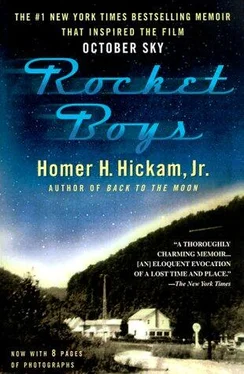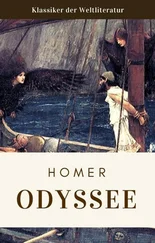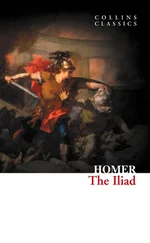Dad frowned at her. “Elsie, I told him we’d both be there.”
Mom pushed me ahead, straightening my tie with one hand around my neck. “I’ll think about it,” she said, and I could almost hear Dad’s teeth grind.
Mom and Dad sat in the back of the church between the Van Dykes and Doc and Mrs. Lassiter. Jim sat with the football boys, all of them still grumpy about being left out of the state-championship game. Actually, Dad had mollified my brother, if only a little. Jim now had exclusive use of the Buick every Saturday night. He didn’t even have to wash it first if he didn’t want to. I wasn’t jealous of his privilege. I had only just turned fifteen and didn’t have a driver’s license yet, and, anyway, Jim had girls to take out. I didn’t, and at the rate I was going, it didn’t look like I ever would.
I found Sherman and O’Dell and we sat up front. When the choir got up to sing, Mrs. Dantzler stepped out for a solo. She stood straight and tall in her maroon robe, and when the sun came through the clear glass windows, her hair glowed like molten silver. When she finished, her voice seemed to still be ringing up in the rafters. The Reverend Lanier stood up and made his way to the pulpit. I thought something about him didn’t look right. He looked a little harried. His robe seemed to be ill-fitting, and his hair needed combing. “Today,” he began in a strangely nervous voice, “I will speak on the general topic of fathers and sons.”
We live, he said to the hushed congregation, in a day and age when fathers often do not receive the respect they should from their sons. At this remark, my antennae went up. The company paid the good Reverend’s salary and was not above suggesting the topic of his sermons, mostly having to do with rendering to Caesar what was Caesar’s. What sons might not be respecting their fathers? Who else but us outlaw rocket boys?
Reverend Lanier told us a little story. There was once a son who did bad things, and every time he did one of them, his grieving father drove a nail in a door. When finally the son came to his senses, his father forgave him and removed each of the nails.
“But though the nails were gone,” Reverend Lanier said sadly, “the holes were still there, representing the pain still abiding in the father’s heart.”
Involuntarily, I slid down in the pew when Reverend Lanier looked directly at me. He had worked a little magic, making me feel guilty for something I didn’t really feel guilty about. Preachers seemed to be good at that. He talked a little more about the poor, abused door and what it meant and then ticked off an appropriate proverb. Just in case I still doubted who he meant it for, he locked his gaze on me once again. A foolish son is the calamity of his father. Cease, my son, to hear the instruction that causeth to err from the words of knowledge .
I slid even farther down in my seat. I could just imagine my father smiling smugly at my mother. I thought I knew the real reason my dad was at church services. The preacher was delivering a company sermon!
But the Reverend wasn’t finished. He took a deep, nervous breath. This time he didn’t look at me but over my head, toward the back pews. “I was taught the story of the door in Bible college, and it’s always stuck with me. I’ve used it more than once to counsel young men who’ve gotten a little too rambunctious. But the events of late right here in Coalwood have gotten me to thinking: What of the father who drove those nails in the door? Rather than hammering nails with anger, what if he had instead gone to his son and shown his love with his time, his interest, his generosity? Perhaps the holes in the door are a reflection of the father’s petulance more than his love.”
After clearing his throat and tugging at his collar, the Reverend continued. “We’ve had some trouble in Coalwood lately,” he said, his voice nearly cracking. “Father–son trouble. Of course, the son must respect his father. But I am also reminded of Proverbs twenty-three, verse twenty-four. He that begetteth a wise child shall have joy of him . To have a child who longs to learn is the sweetest gift of all.”
Although usually there was only silence in the congregation, I heard a few hearty “amens” from the choir box, and then, to my joy, I realized who had influenced at least the second part of this particular sermon. It wasn’t the company. It was the old biddies who filled most of the choir box. The Great Six. Reverend Lanier wasn’t preaching to the choir, he was preaching for it.
The Reverend was on a roll. “Sons, obey your fathers. But fathers, help your sons to dream. If they are confused, counsel them. If they stray, search them out and bring them home. Our Lord said: If a man has a hundred sheep and one of them strays, does he not leave the ninety-nine on the mountains to go out in search of the stray one? And if he manages to find it, I assure you that he is happier over that one than the ninety-nine that did not stray. Fathers, I beseech you to seek out your straying sons and rescue them by keeping their dreams alive. These boys, and we all know I’m talking about our very own rocket boys , are dreaming great dreams. They should be helped, not stifled.”
“Amen,” the Great Six rumbled as one.
Sherman and O’Dell and I looked at one another and grinned. I heard furious whispering among the football boys. But behind us, where our parents sat, there was nothing but stone-cold silence. Reverend Lanier looked intently there and then wiped the sweat off his forehead with the blousy sleeve of his robe. A moment before, he seemed to be lifted high above the congregation, carried aloft by his own rhetoric. Now, perhaps by the reaction he was receiving from certain individuals behind me, he was back on earth. “Of course, this is just a poor preacher’s opinion,” he said in a shaky voice. His eyes darted. “Ummm, the choir will sing now.”
Reverend Lanier sat down, hiding behind the pulpit, but the choir stood up and sang “Faith of Our Fathers” with a special enthusiasm. Afterward, the Reverend was supposed to get up and give the blessing, but he stayed seated. After a moment of hesitation, Mr. Dantzler, who had been elected the company-church deacon for the year, rose and asked for everybody to wait until the choir filed outside. I turned around and saw Dad and Mr. Van Dyke looking sour. Mom and Mrs. Van Dyke had angelic smiles on their faces. As the Great Six filed by, they gave us rocket boys stern looks. I knew what that meant. They’d gone out on a limb for us. We’d better do good.
Jim and most of the other football boys went off down the street, but Buck caught Sherman and O’Dell and me out on the church steps. “The Reverend and everybody else ought to be worrying about the football team, not you sister morons.”
“Izzat so?” O’Dell made as if to take off his jacket. “Come on, big boy, I’ll show you who’s a sister.”
Mom came out of the church at that moment and saw what was afoot. “Hello, Buchanan,” she said to Buck.
“Hullo, Mrs. Hickam,” he said, straightening his tie and his posture all at once. “How are you today?”
“Fine, Buchanan. And you?”
“Jus’ fine,” the big boy said. He looked at us threateningly and then trudged after the other football boys, who were gathering on the Big Store steps.
O’Dell and Sherman both took off in the opposite direction, leaving me with Mom. She said, “Why don’t you wait here a minute, Sonny? I think your dad would like to talk to you.” Then she walked with Mrs. Van Dyke toward the Club House. I looked over at the parking area and saw Dad and Mr. Van Dyke surrounded by Coalwood teachers. When they broke free, the two men huddled and then Dad sought me out and tossed me the keys to the Buick. “Let’s let you practice,” he said, looking and sounding thoroughly disgusted.
Читать дальше
Конец ознакомительного отрывка
Купить книгу












